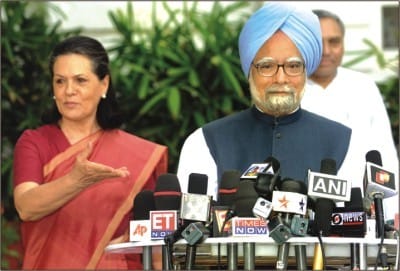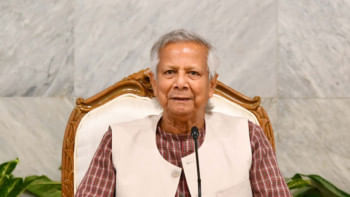Manmohan versus Sonia

Photo: AFP
Prime Minister Manmohan Singh and Congress President Sonia Gandhi burst into Indian political consciousness more or less at the same time, some 15 years ago. He had performed the miracle of moving India's economy from a growth rate of 3.5% to nearly 8%. And she had carried out the impossible task of turning the faction-ridden Congress into a cohesive and disciplined party.
Both, important in their own ways, moved closer to each other when Narshimha Rao lost his prime ministership. He was the one who had kept Sonia Gandhi distant from the Congress. Manmohan Singh saw to it that he would not annoy Sonia Gandhi even though he was the finance minister in Rao's government. She appreciated his devotion to work, without playing any politics. This stood him in good stead.
When the BJP came to power in 1998, Sonia Gandhi preferred Manmohan Singh to Pranab Mukherjee and appointed him the opposition leader. She had recalled that her husband Rajiv Gandhi did not trust Mukherjee because he had toyed with the idea of becoming prime minister himself after the assassination of Mrs. Indira Gandhi. Manmohan Singh's reputation of being loyal was the decisive point in his favour.
There came a time in 1999 when she could become the prime minister and even lay a claim on the formation of the government. President K.R. Narayanan invited her to prove that she had the number. She couldn't do so because Samajwadi Party chief Mulayam Singh Yadav went back on his promise to extend her support unconditionally. Subsequently, he wanted a share of berths in the cabinet. She couldn't do that after having announced that she would have a purely Congress government, although supported by parties from the outside.
However, when Sonia Gandhi could have become the prime minister in her own right in 2004, she declined to accept the position. She had then the future of her son Rahul Gandhi, who had joined politics, in view. Her calculation was that it would be easier for her to bring him in the government from outside than to nominate him as her successor.
Sonia Gandhi was also worried over the campaign of vilification which the BJP had initiated against her. Sushma Swaraj, now the leader of the opposition in the Lok Sabha, publicly said that she would have her head shaved off if Sonia Gandhi, an Italian in origin, became the prime minister. Sonia Gandhi probably thought that every key issue in India could come to be debated against her Italian background, something not in the interest of the country.
Sonia Gandhi opted for the dependable Manmohan Singh, whom she had seen not dabbling in politics. He had gained popularity on the basis of his economic credentials. And she was confident that if need be he would step down anytime at her bidding. This turned out to be true because Manmohan Singh said publicly that he was willing to quit the office whenever the Congress wanted him to do so. At a recent press conference he said that he was ready to make way for Rahul Gandhi.
With this understanding, things worked wonderfully well in the last term of Manmohan Singh in the United Progress Alliance (UPA-1). But it looks as if the same arrangement has developed some functional snags. It is not that Manmohan Singh is less dependable or that the key files do not go to 10, Janpath, Sonia's residence, as it happened from the day the Congress headed the government. It is the lessening image of the government which is creating problems. Of late, too many scams and scandals have tumbled out of the Congress cupboard.
Sonia Gandhi first distanced the party from the government because of the stench over the Commonwealth Games and the 2G spectrum. But when the opposition went on pillorying the government and even stalled Parliament sessions, Sonia Gandhi told the party to rescue the government. But once again the Congress has stepped back to let the government face the music. She has begun to give the impression that the party is traversing its own path, different from that of the government.
The appointment of the Chief Vigilance Commissioner is the recent case to underline the distance between the prime minister and Sonia Gandhi. She has not defended the appointment, nor has she allowed the Congress to do so. Many other differences have come to light. When the prime minister argues that the development cannot be mortgaged to environment or other considerations, she says that fertile land should not be acquired even in public interest. When the cabinet discusses Kashmir and the operation of the Armed Forces Special Act in the state, she convenes the meeting of the Kashmir Committee of the Congress to mull over the situation according to her own light. The two meetings at the same time is more than a coincidence.
On Pakistan, the two seem to differ. West Bengal governor M.K. Narayanan, whose opposite viewpoint with Manmohan Singh over Pakistan has been revealed by Wikileaks, is very close to Sonia Gandhi. He is a family loyalist. An expert of sorts as he is, he has influenced her on Pakistan.
What Manmohan Singh has to watch is that after every situation he comes out a regressive, rigid person while Sonia Gandhi retains the image of confidence and forward looking. He is losing his stock in the public while she is retaining what she has. Her secret is probably to remain silent and not react to even the burning topics.
The nation is amused to find two points of authority in the government: the prime minister has the cabinet and the Congress president the National Advisory Council. And everybody knows who is more powerful and more assertive. True, it is difficult to know where one's authority begins and the other's ends. Yet Manmohan Singh is conscious of the limit to which he can go.
Manmohan Singh may claim that there is no disconnect within the Congress. Yet what do people make out when Sonia Gandhi publicly rebuts the prime minister on the mode of development, and when the Congress secretary-general snaps his fingers to let the nation know that Home Minister P. Chidambaram is wrong in taking punitive action against the Maoists?
When the line of authority is blurred, the demarcation between the prime minister and the Congress president does not make sense. It only adds to the concerns which engulf the country, already beleaguered by many problems. Manmohan Singh's main drawback is that he is not a political person. He is too dependent on bureaucrats and too absorbed in official work. At the same time, he has to honour the coalition dharma, the line of which Sonia Gandhi lays down. His job is, indeed, unenviable.

 For all latest news, follow The Daily Star's Google News channel.
For all latest news, follow The Daily Star's Google News channel. 



Comments